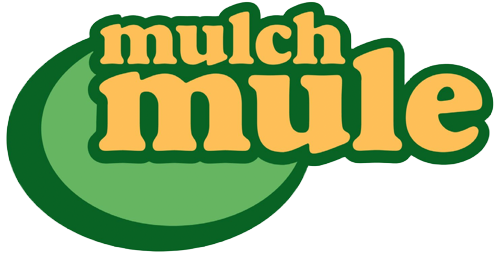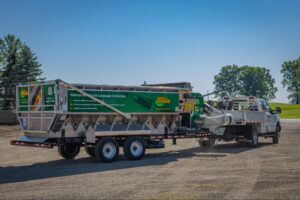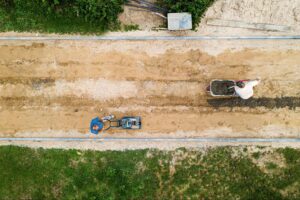Navigating the challenges of managing a landscaping business in today’s environment demands strategic foresight and practical execution. With rising operational costs, persistent labor shortages, and ever-growing customer expectations, landscaping professionals need to blend innovative leadership with efficient practices.
For the landscaping industry success will hinge on taking advantage of new technologies, streamlining daily processes, building a motivated workforce, and prioritizing safety. This article provides actionable leadership tips for landscaping that will help establish a clear direction for sustainable growth.
The Role of Leadership in Landscaping
Strong leadership is the cornerstone of any thriving landscaping business. Your vision and decision-making directly guide both daily operations and long-term strategy. More than simply supervising tasks, effective leaders inspire a culture of resilience and innovation that can adapt quickly to changing industry trends and client preferences.
Landscaping business owners are currently tackling multiple challenges:
- Landscaping labor shortages: Finding skilled workers is increasingly difficult, making employee retention and structured training essential.
- Rising costs: Services, materials, and labor have all gone up in price, necessitating more precise budgeting to maintain profitability.
- Heightened customer expectations: Clients demand visually appealing, eco-friendly landscape designs and a high level of service.
Addressing these issues requires a strategic mindset. As a leader, developing clarity of purpose, building employee capabilities, and harnessing data-based insights can help you transform industry obstacles into growth opportunities. This mindset ensures your team remains focused, motivated, and ready to expand capabilities in an ever-evolving marketplace.
7 Leadership Tips to Employ Today
To successfully navigate the complexities of running a contemporary landscaping business, leveraging an array of leadership strategies is critical. Below are key tips that will be discussed in detail to help you effectively lead your business towards sustained growth and success:
These tactics will not only address the current challenges in the landscaping industry but will also set a foundation for future growth and innovation.
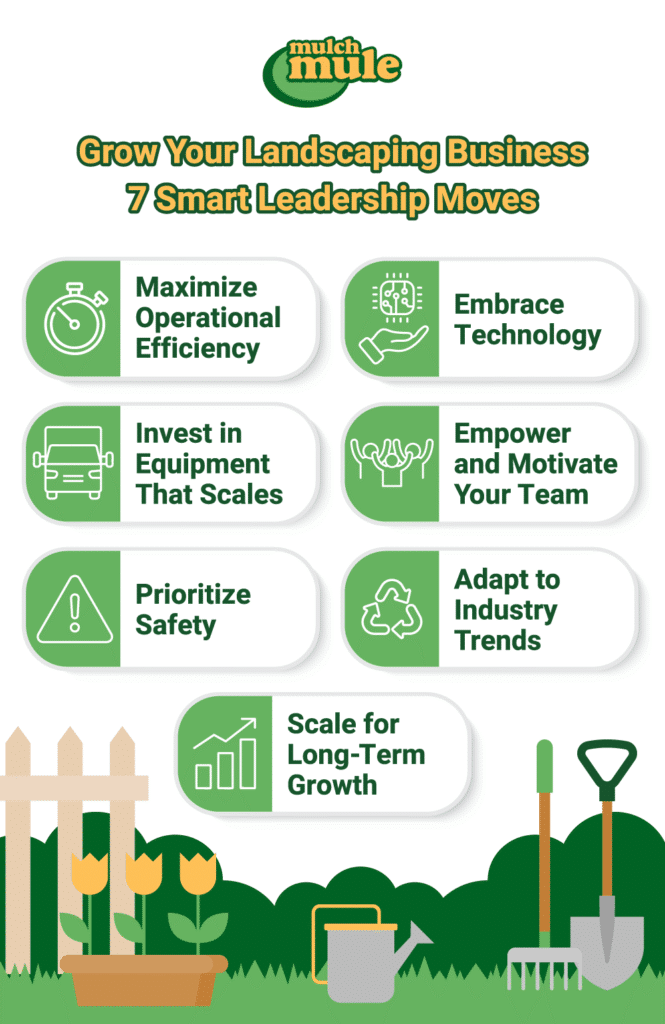
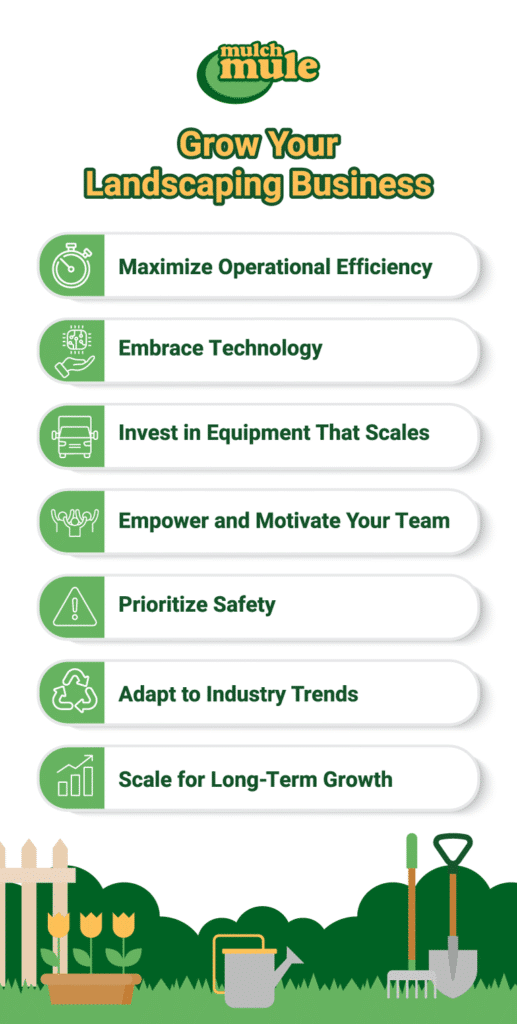
1) Maximize Operational Efficiency with Smart Strategies
Operational efficiency is an essential differentiator in a crowded field. By refining workflows and eliminating redundant tasks, you can free up resources that enable higher-quality service and improved profitability. Key steps include:
- Pinpointing inefficiencies: Evaluate project scheduling, site logistics, and materials handling. Simple changes, such as reorganizing material storage or coordinating better with suppliers, can significantly reduce delays.
- Optimizing resource allocation: Ensure the correct crew size, equipment, and materials are in place for each project. Both overstaffing and underutilizing machinery can drive up costs and affect productivity.
- Modernizing your fleet and equipment: Technology-forward equipment can make daily tasks more efficient. For instance, switching from manual loading to automated systems—like an advanced quick-discharge trailer—can streamline handling bulk materials. This type of equipment is designed to reduce the time spent on loading and unloading tasks, which may allow your team to focus on additional project needs.
Additionally, welcome your team’s input on streamlining operations. Encourage open discussions where employees point out bottlenecks and propose solutions. This approach fosters collaboration, empowers staff, and reinforces a shared mission in driving the business forward.
2) Embrace Technological Advancements
Landscaping technology has evolved rapidly, presenting solutions that enhance precision, productivity, and safety. Forward-thinking leaders view technological adoption as a vital strategy for staying competitive. Here are three focus areas:
- Automated Equipment: Investing in automated machinery, such as curbside material discharge systems and live floor trailers, can relieve your team from repetitive physical tasks while enhancing work efficiency. Tools like the Mulch Mule Trailer are engineered to cut down on the time required for tasks such as loading and unloading mulch, potentially allowing for a smoother workflow.
- Management Software: Cloud-based platforms for scheduling, fleet monitoring, and inventory tracking offer real-time oversight of operations. Alerts about equipment availability or scheduling conflicts enable more responsive, data-driven decisions.
- Predictive Analytics: Artificial intelligence is increasingly used for forecasting labor needs, project costs, and resource usage. By extrapolating from historical data, predictive analytics can help plan resource allocation more effectively, supporting a well-organized and proactive approach.
Incorporating these technologies not only helps streamline operations but also offers the potential to optimize labor allocation across projects.
3) Subtle Investments for Big Returns: Leveraging Mulch Mule
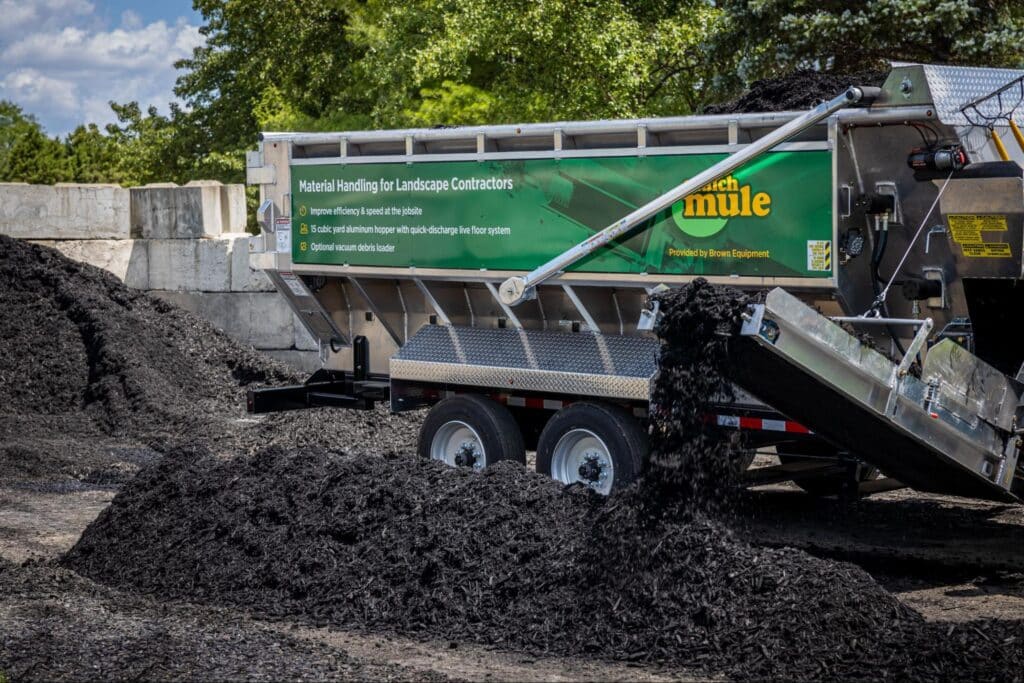
While technology streamlines day-to-day tasks, proven equipment remains central to efficient landscaping operations. Equipment that is designed to manage a variety of landscaping materials. Whether dealing with mulch, stone, soil, or debris, can simplify the handling process while promoting safety and operational speed.
Look for equipment that offers:
Year-Round Landscaping Equipment
Look for a solution that supports property maintenance in every season. From handling fall leaves to distributing spring soil, mechanized systems help meet shifting project demands reliably.
Improved Labor Efficiency and Safety
Automated features—such as a live floor system and remote-controlled discharge—streamline the material handling process. While the precise labor savings can vary from project to project, many businesses report that such equipment allows for improved allocation of crew members and potentially minimizes the need for extra staff on each job.
Scalability and Profitability
As your business grows, strategically designed equipment can help accommodate larger projects without compromising operational efficiency. Handling larger volumes per trip may open opportunities to accept more assignments, which can, in turn, support business expansion.
By investing in efficient landscaping solutions you can achieve improvements in productivity that may create room for additional work and more flexible resource management.
4) Foster a Happy, Skilled, and Motivated Team
Leading a team successfully means prioritizing employee satisfaction and continuous growth. A stable workforce with minimal turnover translates to consistent workmanship and enhanced customer satisfaction. To achieve this you must implement:
- Ongoing Training: Comprehensive training ensures employees are proficient in equipment operation and safety practices. Encourage ongoing skill development and certification opportunities to keep your team engaged and confident.
- Open Communication: Regular, transparent updates about company goals and strategies help employees understand how their work contributes to the broader success of the business. This shared vision fosters unity and drives effort.
- Recognition and Incentives: Public acknowledgments, celebratory team events, and small performance bonuses boost morale. Simple gestures—such as a handwritten note or a shout-out during a meeting—can reinforce a positive culture and motivate your team to excel.
Investing in ergonomic, labor-saving equipment can be just as important to team morale as recognition programs, showing your commitment to both efficiency and employee well-being.
5) Prioritize Safety to Protect Employees and Business
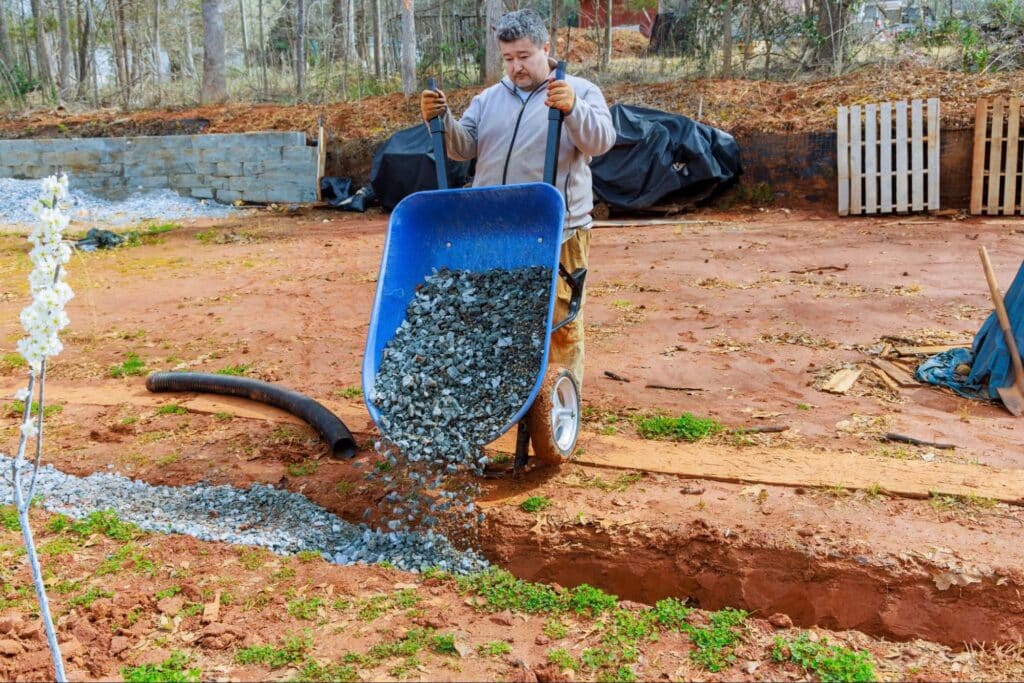
Safety remains at the heart of any successful landscaping operation. Overlooking safety protocols can lead to project delays, increased costs, and diminished morale. Leaders should consider these safety measures:
- Routine Safety Meetings: Regular meetings provide refreshers to the team to ensure that operations adhere to updated safety practices and proper equipment use.
- Regular Safety Assessments: Routine inspections of vehicles, attachments, and tools can help identify hazards before they result in accidents. Promptly addressing any issues strengthens overall safety.
- Investing in Ergonomic Equipment: Modern designs such as automated quick-discharge trailers help minimize physical strain and reduce the risk of work-related injuries. Adhering to OSHA guidelines for landscaping safety further fortifies your commitment to a secure work environment.
Demonstrating a genuine concern for employee safety builds a safer, more productive work environment that benefits both your team and your business reputation.
6) Adapt to Industry Trends and Emerging Customer Demands
The landscaping industry is continually evolving, influenced by innovations, environmental considerations, and shifting customer expectations. A flexible business strategy helps you stay ahead:
- Sustainability and Eco-Friendly Solutions: Embracing sustainable practices like water-wise irrigation and native planting can set your business apart. These initiatives not only reduce operational costs over time but also enhance your reputation as an environmentally responsible operator.
- Diversification: Expanding your service offerings—be it design consultation, regular maintenance, or seasonal projects—helps mitigate the impacts of market fluctuations while boosting customer loyalty.
- Customer-Centric Innovation: Regularly soliciting customer feedback and integrating technology into your service delivery can help you remain relevant and responsive. Innovative tools such as 3D design software can enhance both the planning and execution phases of landscaping projects.
Staying attuned to market trends enables you to adjust services proactively, ensuring your business remains competitive in a dynamic landscape.
7) Scale Your Business with Future-Ready Solutions
Growth is a key ambition for many landscaping companies, but scaling must be managed carefully without compromising service quality. Consider these strategies:
- Scalable Equipment and Materials Management: Equipment like the high-capacity Mulch Mule Trailer is designed to handle more volume efficiently. Investing in versatile attachments that cater to diverse material handling needs can support scaling efforts across broader projects.
- Process Automation: Leveraging software for billing, scheduling, and customer communication can help streamline operations significantly. Automated systems reduce administrative burdens, enabling your team to focus on core tasks.
- Flexible Business Models: Exploring options such as franchising or strategic partnerships can broaden your market reach. A diversified approach provides stability against localized downturns and unforeseen market shifts.
Building a robust infrastructure—supported both by advanced machinery and effective workflows—ensures you can confidently expand your business operations over time.
Real-World Example: From Struggling to Steady Growth with Mulch Mule
Consider Gage Brothers Property Management, a mid-sized landscaping company that faced high labor costs and slow project turnaround times. After identifying material handling as a bottleneck, the owner invested in a Mulch Mule Trailer system. Following the upgrade:
- Enhanced Operational Efficiency: The reduced time spent on loading and unloading contributed to a smoother workflow, allowing the team to reallocate efforts toward other critical tasks.
- Optimized Labor Allocation: Efficiency improvements meant that fewer crew members were needed on certain tasks, potentially easing overall labor demands.
- Improved Employee Morale: With streamlined processes and decreased physical strain, team members experienced fewer injuries and reported a more supportive work environment.
Profitability, efficiency, simplicity, and employee morale are just some of the benefits of using Mulch Mule for mulch, soil, gravel and then vacuuming leaves in the fall. Andrew and Anthony Gage are now happy customers of two Mulch Mules! They took a bold step as leaders of the business and invested in efficiency. It paid off!
Click on the video below to hear what they have to say about their experience with the Mulch Mule.
Invest in an Efficient Landscaping Solution for Your Business
Effective leadership remains key to landscaping business success. By focusing on operational efficiency, technological innovation, team development, and robust safety measures, you can navigate current challenges while preparing for future demands. Embracing solutions like the Mulch Mule product line reinforces your business’s ability to adapt, scale, and maintain high standards of service.
Ready to propel your business forward in a dynamic market? Get a quote for the Mulch Mule Trailer and get expert guidance on optimizing operations.
